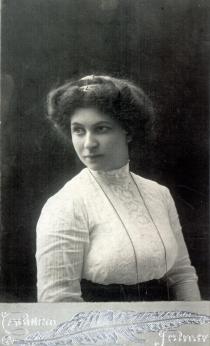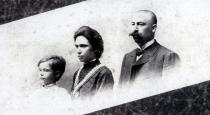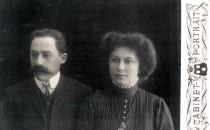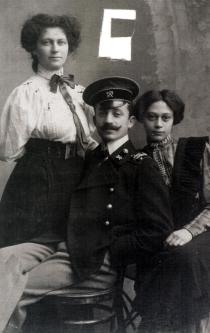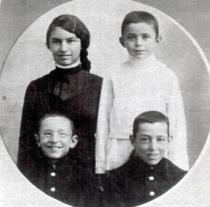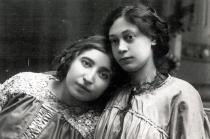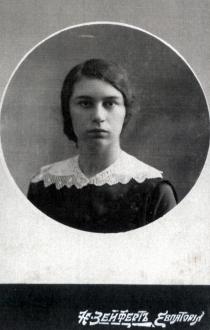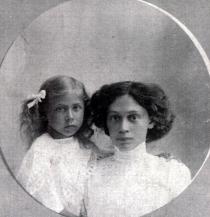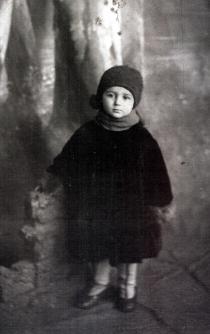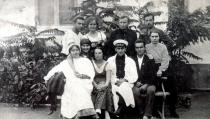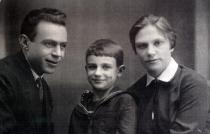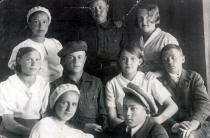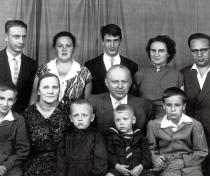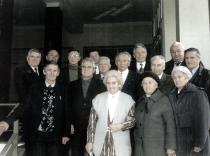My father Grigory Shwartz in a white shirt, his older sister Revekka on his right; sitting: my father's brothers Izia and David (wearing glasses). Photo made in Evpatoria in 1911 when one of the brothers went to grammar school.
My grandmother Bertha married Ilia Shwartz, a Jewish man, in 1893. They had a big traditional Jewish wedding with a huppah, kleizmers, a number of guests and lots of presents. The newly weds lived with my grandmother's parents for some time before they rented an apartment. In 1904 they moved to Evpatoria. My grandfather was a trade agent and my grandmother was a housewife. I would say Bertha and Ilia were moderately religious. They followed the kashrut and celebrated Saturday. However, if my grandfather had something important to do on Saturday or meet with his client he did what he had to do regardless of Saturday. On Saturday Ilia and Bertha went to synagogue. They celebrated Jewish holidays: Yom Kippur, Rosh Hashanah, Chanukah, Purim and Pesach. Their children - my father and his brothers and sisters - didn't observe any Jewish traditions. They were devoted to new communist ideals. Their parents treated them with understanding; they thought their children had to live their own life even if they didn't quite understand the new tendencies in life.
In 1894 my father's sister Revekka was born. She finished grammar school and graduated from the medical faculty of Kharkov University. She became a rontgenologist. Her husband Mark Sokol, a Jew, was also a doctor. They lived in Kharkov. Their only son Alik drowned during military training in Odessa when he was 20. Revekka and Mark were military doctors- they worked in military hospitals through the Great Patriotic War. Revekka died in 1964 and Mark died in the late 1960s.
My father's brother David was born in 1896. He also finished grammar school and got a higher education - I don't know where he studied. He became a chemical engineer. He lived in Moscow, worked in a Military Academy and was a member of the Party. His wife Anna was an English teacher. She was a very nice and educated woman. They had two children. In 1937 David was arrested and nobody ever heard about him again. Anna went with her children to her parents in Taganrog. During the war they didn't evacuate and were exterminated along with other Jews of the town.
Isaac, (Izia) was born around 1900. He was a sickly boy that died in infantry in 1915.
My father Grigory Shwartz, the youngest in the family, was born in 1903 and was named Gershl at birth. His schoolmates at grammar school began to call him Gennady and when he was obtaining his passport he changed his first name to Gennady. In 1904 my father's family moved to Evpatoria due to his brother Izia's illness - he had lung problems and doctors advised his parents to move to an area with warm and dry climate. My grandfather bought a one-storied brick house with four big rooms and a kitchen in one of the central streets in Evpatoria where they settled down. They bought new furniture in Simferopol: new wooden beds, wardrobes and chests of drawers. My grandparents' was a wealthy family. My father didn't tell me anything about the Jewish way of life in his family - I think that he was reluctant to recall his Jewish origin when he became a Soviet official. I remember him telling me about Pesach when he asked traditional questions about the history of the holiday and about matsah during Seder and his father answered these questions. I know that my grandmother and grandfather went to the synagogue in one of the central streets on big holidays. They moderately followed the kashrut rules in the house: had individual dishes for meat and dairy food and didn't mix food. My grandparents were raising their children religious. They lit candles on Saturday and celebrated Shabbat. However, when their children grew up they gave up observing Jewish traditions. However, my grandfather also had his part in this - he didn't give his children classical Jewish education. His sons didn't go to cheder or they didn't have Jewish teacher to teach them at home. My father went to a grammar school, but he didn't finish it due to the revolution of 1917. In 1916 he became a member of an underground Marxist group and after the revolution he became head of the Party unit in Evpatoria. When Komsomol was organized in 1918 my father became secretary of he party organization of Evpatoria. He made a prompt career being a leader by character. In 1919 my father became a member of the Communist Party. My father met my mother in 1916. They fell in love with one another and got married in 1921 when my father turned 18.

